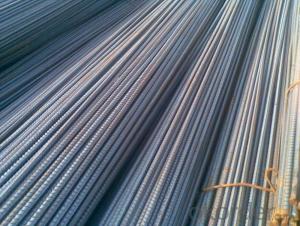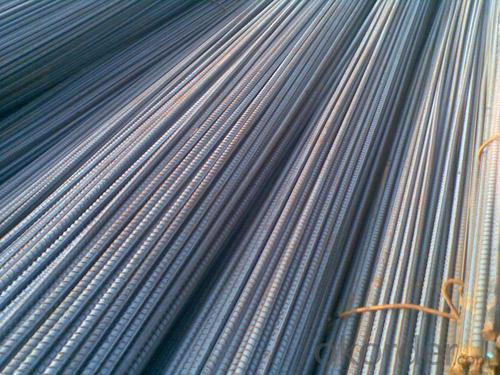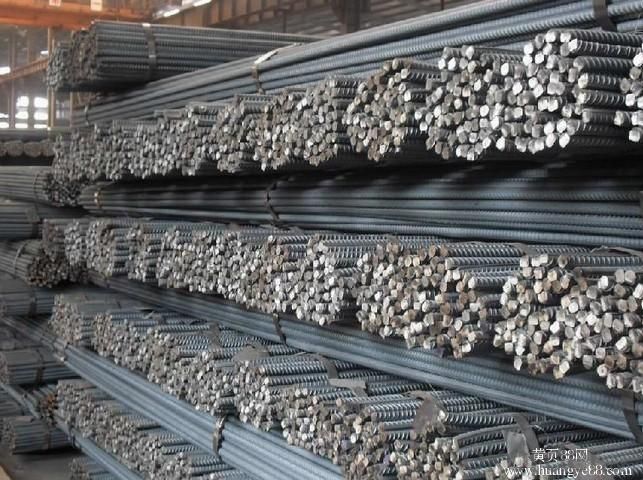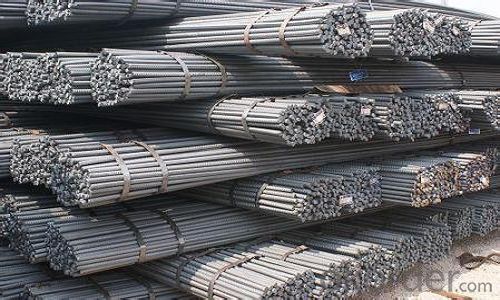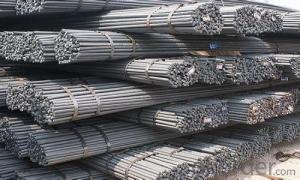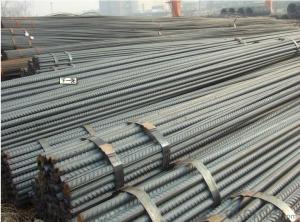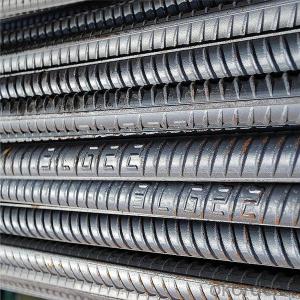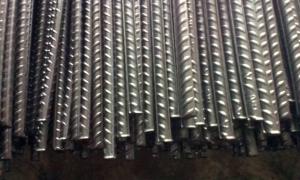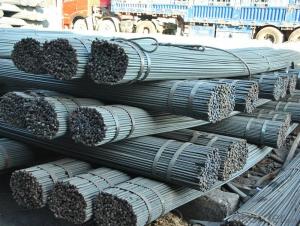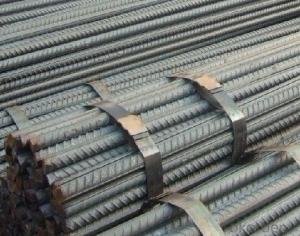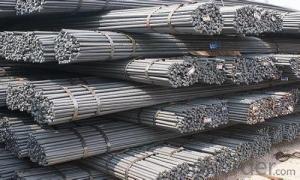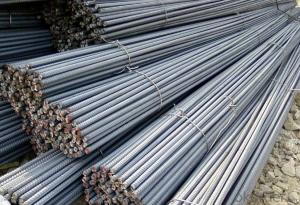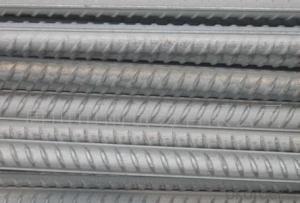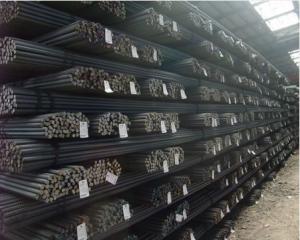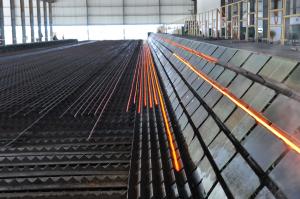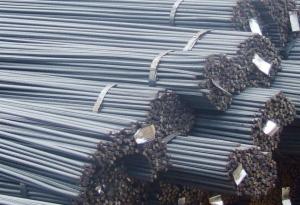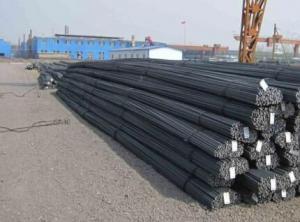6mm-32mm Cheap Export Deformed Steel Bar
- Loading Port:
- Shanghai
- Payment Terms:
- TT OR LC
- Min Order Qty:
- 100 m.t.
- Supply Capability:
- 1000 m.t./month
OKorder Service Pledge
OKorder Financial Service
You Might Also Like
deformed steel bar grade 40
material: HRB400, BS4449 GR460B
size: 8-36mmx12m.
short delivery time by bulk or container
deformed steel bar grade 40
material: HRB400, BS4449 GR460B
size: 8-36mmx12m.
short delivery time with bulk or container
packing: Mill standard export packing in bundles/coil, around 2tons/bundle.
country of Origin: China
delivery Time: Within a 35 days
Shipment: by bulk vessel or by container
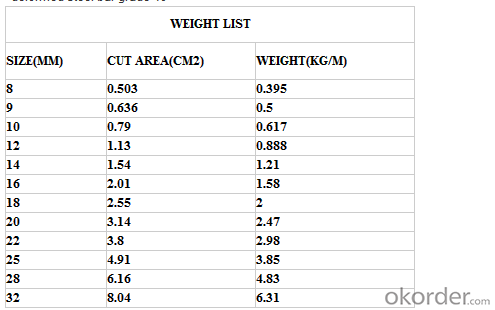
Leading goods:
section steel:angles,channels,I-beam,H-beam;
coils:cold/hot rolled coils,PPGI,galvanized coils,plate,checkered plate,cutting steel plate,steel strip;
wire rod:steel wire,deformed wire,bar;
pipe:seamless pipe,rectangular pipe,welded pipe,spiral welded pipe,pipe fittings;
stainless steel:steel sheets,stainless steel strips,stainless bar,stainless tube;
special:weathering steel,shipbuilding steel;
construction steel:C-channel,Z-channel,T-bar,high-speed divider plate,corrugated steel plate,steel grating.
Advantage:
We are the spot supplier, Six huge warehouses which can hold 20,000 MT goods.
It makes the cost lower than others,we can provide the competitive price for you.
Delivery time:
Normal sizes can be provided in 7days, the others should be ready in 30---45 days.
Further treatment:
We can offer cutting,painting,drilling holes,bending,threading, welding,galvanization,packing etc.
Security interest:
We have already passed the ISO9001, BV and SGS authentication which makes the quality secured.
If you have the interest in any of the products we can provided, pls don't hesitate to connect with me. Looking forward to cooperate with you.
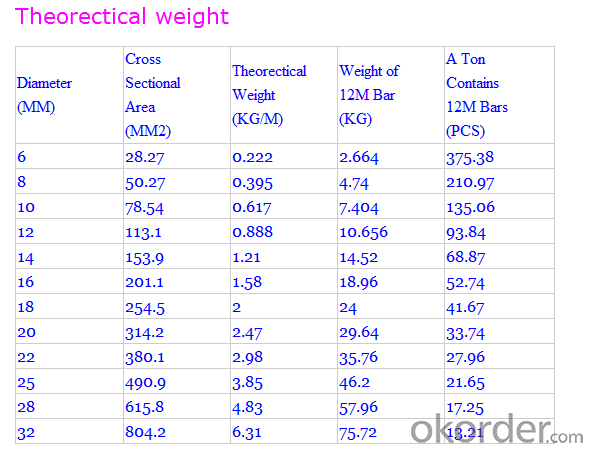
FAQ of Steel Deformed Bar
1. More than 10 years experience in this industry
2. 100,000 tons exporting per month
3. Professional foreign trade tea
4. OEM&ODM capacity
5. High quality assured & competitive price
6. Try our best to meet your needs & save your budget
7. Very popular in Southeast Asia, Africa, Mid-East and South America etc.
8. VIP membership system, first time customers and long-term cooperation customers can get extra discount on some products.
- Q: What are the common mistakes to avoid when handling and storing steel rebars?
- When handling and storing steel rebars, it is important to avoid certain common mistakes to ensure their quality and longevity. Here are some mistakes that should be avoided: 1. Poor storage conditions: Storing steel rebars in damp or wet areas can lead to corrosion and rust. It is crucial to store them in a dry and well-ventilated space to prevent moisture accumulation. 2. Insufficient support: When stacking rebars, it is important to have proper support to prevent bending or deformation. Inadequate support can lead to rebar damage and compromise their structural integrity. 3. Improper lifting techniques: When handling rebars, it is essential to use proper lifting equipment and techniques. Using hooks or chains directly on the rebars can cause damage and weaken them. It is recommended to use lifting devices specifically designed for rebar handling. 4. Overloading: Avoid overloading storage racks or platforms with excessive weight. Overloading can cause structural failure and potentially injure workers. Always follow the manufacturer's guidelines for maximum weight capacity. 5. Lack of protection: Rebars should be protected from exposure to moisture, dirt, and other contaminants. Proper wrapping with plastic or waterproof covers can help prevent corrosion and maintain their quality. 6. Improper transportation: During transportation, care should be taken to secure the rebars properly to prevent movement or damage. Using appropriate restraints and padding can help prevent any potential accidents or rebar displacement. 7. Mixing different grades: Avoid mixing rebars of different grades together as they have varying strength and performance characteristics. Mixing different grades can compromise the overall structural integrity of the construction project. 8. Ignoring quality control: It is important to conduct regular quality checks on the rebars to ensure they meet the required specifications. Ignoring quality control can result in the use of substandard rebars, which can compromise the safety and durability of the structure. By avoiding these common mistakes, construction professionals can ensure the proper handling and storage of steel rebars, leading to safer and more durable structures.
- Q: What are the guidelines for proper bending of steel rebars on construction sites?
- To guarantee the structural integrity and safety of buildings, it is crucial to adhere to guidelines for bending steel rebars on construction sites. The following are key guidelines that should be followed: 1. Utilize appropriate tools: Make use of a specialized rebar bending machine or manual rebar bender designed specifically for steel rebars. These tools enable precise bending without causing any damage or weak points on the rebar. 2. Accurately determine the required bend angle: Before bending, accurately measure and mark the desired bend angle on the rebar. Use either a protractor or a bending template to achieve the angle you desire. 3. Adhere to the bending radius: The bending radius refers to the minimum radius at which the rebar can be bent without sustaining any damage. Always follow the recommended bending radius provided by the manufacturer or structural engineer to prevent fractures or deformations. 4. Secure the rebar firmly: Before bending, ensure that the rebar is securely fastened in the bender to prevent any slipping or movement during the bending process. This guarantees precise bending and reduces the risk of accidents. 5. Employ a gradual bending process: When bending the rebar, apply gradual pressure and avoid sudden or excessive force. This gradual bending approach minimizes the risk of cracks or fractures and preserves the rebar's structural integrity. 6. Conduct a thorough inspection of the bend: After bending, carefully examine the rebar to ensure that it matches the desired angle and displays no visible defects or stress marks. Any faulty bends should be rectified immediately. 7. Proper storage practices: Store the bent rebar in a designated area, preferably on a flat surface, to prevent any distortion or damage. Avoid placing heavy objects on top of the bent rebar to maintain its shape and strength. 8. Observe safety precautions: Always wear appropriate personal protective equipment (PPE), such as gloves and safety glasses, while performing bending operations. Ensure that the work area is free of obstacles and other workers to prevent accidents. 9. Maintain proper documentation: Document the bending process, including the angle, radius, and any deviations or issues that arise. This information can be valuable for quality control purposes and future reference. 10. Comply with building codes: Ensure that the bending process aligns with local building codes and regulations. Seek guidance from a structural engineer or relevant authorities if necessary. By adhering to these guidelines, construction professionals can ensure the proper bending of steel rebars, resulting in a building that is structurally sound and safe.
- Q: How do steel rebars contribute to the overall structural integrity of a building?
- Steel rebars, also known as reinforcement bars, play a crucial role in enhancing the overall structural integrity of a building. They are embedded within concrete structures to provide tensile strength, which complements the compressive strength of the concrete. By resisting tension forces, steel rebars help prevent cracks and failure in the concrete, ensuring the structural stability and durability of the building.
- Q: Can steel rebars be used in parking structures?
- Yes, steel rebars can be used in parking structures. Steel rebars are commonly used in the construction of parking structures due to their high strength, durability, and ability to reinforce concrete. They provide the necessary structural support to withstand the weight and load of vehicles, making them a suitable choice for parking structures.
- Q: What is the role of steel rebars in increasing the load-carrying capacity of a structure?
- The role of steel rebars in increasing the load-carrying capacity of a structure is to provide reinforcement and strength to the concrete. The rebars act as tension members, resisting the tensile forces that the concrete alone cannot handle effectively. By adding steel rebars to the structure, it becomes more resistant to bending, cracking, and failure under heavy loads. The rebars distribute the applied load across a larger area, enhancing the overall structural integrity and allowing for greater load-carrying capacity.
- Q: Can steel rebars be used in structures with high noise reduction requirements?
- When structures require high noise reduction, steel rebars may not be the most effective solution by themselves, although they can still be utilized. Steel rebars possess sound-dampening properties due to their common usage in construction. However, their primary purpose is to strengthen and reinforce structures, rather than minimize noise transmission. To achieve significant noise reduction in structures, additional measures must be taken, such as incorporating acoustic insulation materials or employing specific design techniques. These techniques may involve the utilization of double walls, sound-absorbing panels, resilient mounts, and other specialized acoustic treatments. Although steel rebars alone do not offer substantial noise reduction, they can still contribute to overall noise reduction endeavors when combined with other soundproofing techniques. It is advisable to consult acoustic experts or engineers to determine the most suitable combination of materials and design strategies to fulfill a structure's specific noise reduction requirements.
- Q: What are the advantages of using deformed steel rebars?
- There are several advantages of using deformed steel rebars in construction. Firstly, the deformations on the surface of the rebars create a strong bond with the surrounding concrete, enhancing the overall structural integrity of the reinforced concrete. Secondly, the rough surface of the rebars provides increased resistance against slipping, preventing potential failures due to movement or seismic activities. Additionally, deformed rebars offer improved load-bearing capacity, enabling them to withstand higher loads and stresses compared to plain steel rebars. Lastly, the increased ductility of deformed rebars allows for better absorption of energy during earthquakes or other dynamic forces, making them a reliable choice for seismic zones.
- Q: Can steel rebars be used in railway and transportation infrastructure?
- Yes, steel rebars can be used in railway and transportation infrastructure projects. Steel rebars are commonly used in the construction of bridges, tunnels, and other transportation-related structures due to their high strength, durability, and ability to withstand heavy loads. They provide structural reinforcement and enhance the overall stability and longevity of railway and transportation infrastructure.
- Q: How are steel rebars connected or joined together during construction?
- During construction, there are several methods and techniques for connecting steel rebars. One common method is to overlap the rebars and tie them together with steel wire, a process known as rebar tying or wire tying. To ensure a strong and secure connection, the rebars are overlapped at a length typically 40 to 60 times the diameter of the rebars. This overlapping length allows for load transfer and structural integrity. Once properly overlapped, steel wire is tightly wrapped around the intersection point to hold the rebars together. Another method is to use mechanical couplers, which are pre-fabricated devices that join two rebars together. These couplers provide a threaded connection, allowing for a more precise and efficient joining process. The rebars are inserted into the couplers and tightened using a wrench or appropriate tool. In larger construction projects, welding is also used to connect rebars. This involves melting the rebars at the intersection point and fusing them together with heat and pressure. Welding provides a strong and permanent connection but requires skilled labor and safety precautions. In some cases, rebars can be connected using epoxy bonding. This involves applying adhesive to the rebars' surface and pressing them together. The epoxy acts as a bonding agent, creating a durable connection. The method of connecting rebars depends on factors like rebars' size, project requirements, and construction techniques. It's important to follow industry standards and guidelines to ensure proper connection and integrity, as rebars play a critical role in reinforcing concrete structures.
- Q: How do steel rebars affect the overall strength of concrete structures?
- Steel rebars significantly contribute to the overall strength and durability of concrete structures. They are commonly used as reinforcement in concrete to enhance its tensile strength, which is the ability to withstand pulling or stretching forces. Concrete on its own is strong in compression but weak in tension. When external forces like bending or stretching are applied to the concrete, it tends to crack and fail. This is where steel rebars play a crucial role. By adding rebars to the concrete, the tensile strength of the structure is greatly improved. The rebars act as a strong skeleton within the concrete, providing resistance against tensile forces. When the concrete is subjected to tension, the rebars take up the load and distribute it evenly, preventing cracks from forming and enhancing the overall strength of the structure. This reinforcement also helps to limit the propagation of cracks, ensuring that the structure remains intact and stable even under substantial loads or adverse conditions. Moreover, steel rebars also enhance the structural integrity of concrete structures by improving their resistance to bending, shearing, and torsional forces. They increase the stiffness and stiffness modulus of the concrete, making it more resistant to deformation and enhancing its load carrying capacity. In addition to improving the structural strength, steel rebars also play a vital role in preventing corrosion of the concrete. They are made of corrosion-resistant materials, such as stainless steel or galvanized steel, which protects the concrete from moisture and other corrosive elements. This ensures the longevity and durability of the concrete structure. In conclusion, steel rebars significantly enhance the overall strength and durability of concrete structures by improving their tensile strength, resistance to bending and shearing forces, and preventing corrosion. They provide the necessary reinforcement to make the concrete capable of withstanding external forces, ensuring the safety and longevity of the structure.
Send your message to us
6mm-32mm Cheap Export Deformed Steel Bar
- Loading Port:
- Shanghai
- Payment Terms:
- TT OR LC
- Min Order Qty:
- 100 m.t.
- Supply Capability:
- 1000 m.t./month
OKorder Service Pledge
OKorder Financial Service
Similar products
Hot products
Hot Searches
Related keywords
